-
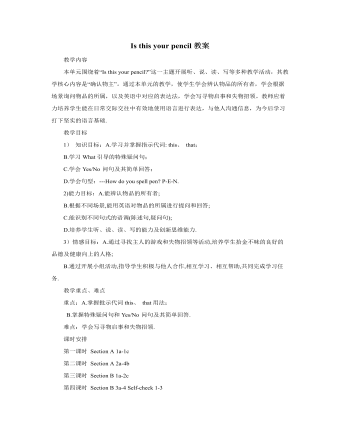
人教版新目标初中英语七年级上册Is this your pencil教案
T: Please look at the pictures and learn the new words.(用多媒体展示新单词效果较好。)1.at prep. 在(里面或附近);在(点刻);2.theart.表示特指的人、物、事或群体 3.lostadj.丢失的;遗失的4.Found adj. (find的过去式、过去分词)找回的5.lost and found 失物招领6.please adv.请7.school n. 学校8.a set of一套;一副(Teach students to read the words.)2. Practice the new words. (事先录制一段短的听力,让学生通过听的训练来强化所学的新单词,并为学习写寻物启示和失物招领作好准备。)T: Please listen to a short passage twice then fill the blanks using the words we learned.(Show students a short passage and play the recording for the students to listen.)There are many things in (1)_____________________in my (2)__________. Look, here’s (3)_________keys. Is this yours? (4)__________call Jim (5)___________753-2289.Typescript:There are many things in the Lost and Found in my school. Look, here’s a set of keys. Is this yours? Please call Jim at 753-2289.
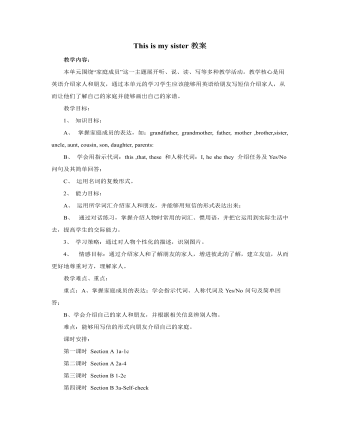
人教版新目标初中英语七年级上册This is my sister教案
(Play the recording twice again.) (Check the answer.) ③Pairwork. Draw your own picture and talk about it. T: We find out the picture of Lin Hai’s family. Can you draw a picture of your family? SS: … T: OK. When you finish drawing, tell your partner about your picture. You can use “This is …” and “ These are …” to talk about. Then report it to the class. (Students work.) (Check students’ work. Ask two or three students to report.) Step Three: Task. Talk about the family tree. T: Look at the family tree. I think it’s a big family. You can do it in groups of four or three. You can do it in pairs or only by yourself. Then report it to the class. (Students work. Teacher walks around in the classroom and helps the students.) T: Stop here. Let’s check it out. (Choose students to do it.) S1: Look at my family tree. This is my… This is my … They have two … This is my … This is my …This is my …This is my. My parents have two children. This is…This is my …My uncle and my aunt have a son. He is my … (Ask two more students to do it.) Homework. Write a passage about your family.
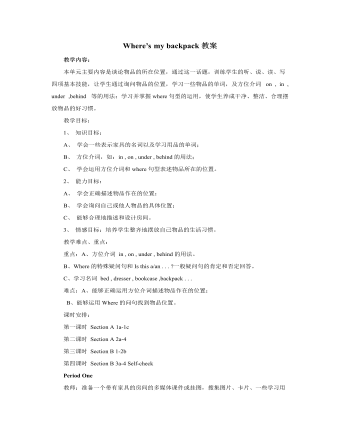
人教版新目标初中英语七年级上册Where’s my backpack教案
教师: 搜集单词卡片、背景资料。 学生:彩笔、大白纸、相关新单词。 教学设计 Step One: Learn the new words. 1.Present the new words. (Show some pictures and words on the screen to teach the students the new words.) T: What’s this? S1: It’s a room. T: Do you have a room like this? S2: Yes, I do./ No, I don’t. T: Read after me. R-O-O-M, room. Ss: R-O-O-M, room. (Teach the other words “TV, desk, picture” in the same way.) T: There are some words here. Read the words after me and spell them. (Learn the other words without pictures on the cards.) T: This is a word. Can you spell this word? (Point to a word in the card.) S1: Yes, I can. / No, I can’t. (Let them know the meaning of “can”.) T: I can spell your name. Can you spell my name? S1: Yes, I can. T: Can you write your name? S: Sorry, I can’t. I have no pen. T: You need a pen.( Give him a pen.) ( Let the students understand the word “need”.) T: I bring a football to school every day. Now it is on the floor. After class I take it to my home. (Teach “bring” and “take”. Put a football on the floor and point to the floor to teach the word “floor”.) 2.Practice the words. (Give the examples to the students and get the students to understand the new words.) Step To Listen and practice.
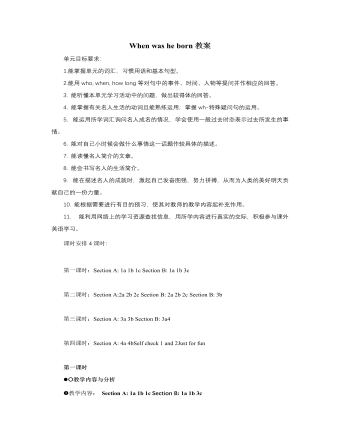
人教版新目标初中英语八年级上册When was he born教案
1.能掌握单元的词汇,习惯用语和基本句型。2.能用who, when, how long等对句中的事件、时间、人物等提问并作相应的回答。3. 能听懂本单元学习活动中的问题,做出较得体的回答。4. 能掌握有关名人生活的动词且能熟练运用;掌握wh-特殊疑问句的运用。5. 能运用所学词汇询问名人成名的情况,学会使用一般过去时态表示过去所发生的事情。 6. 能对自己小时候会做什么事情这一话题作较具体的描述。7. 能读懂名人简介的文章。8. 能会书写名人的生活简介。9. 能在描述名人的成就时,激起自己发奋图强,努力拼搏,从而为人类的美好明天贡献自己的一份力量。10. 能根据需要进行有目的预习,使其对教师的教学内容起补充作用。11. 能利用网络上的学习资源查找信息,用所学内容进行真实的交际,积极参与课外英语学习。课时安排4课时:第一课时:Section A: 1a 1b 1c Section B: 1a 1b 3c第二课时:Section A:2a 2b 2c Section B: 2a 2b 2c Section B: 3b
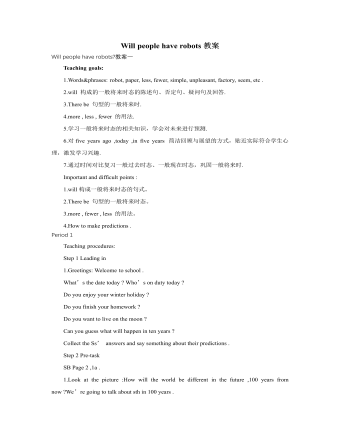
人教版新目标初中英语八年级下册Will people have robots教案
Teaching goals:1.Words&phrases: robot, paper, less, fewer, simple, unpleasant, factory, seem, etc .2.will 构成的一般将来时态的陈述句、否定句、疑问句及回答.3.There be 句型的一般将来时.4.more , less , fewer 的用法.5.学习一般将来时态的相关知识,学会对未来进行预测.6.对five years ago ,today ,in five years 简洁回顾与展望的方式,贴近实际符合学生心理,激发学习兴趣.7.通过时间对比复习一般过去时态、一般现在时态,巩固一般将来时.Important and difficult points :1.will构成一般将来时态的句式。2.There be 句型的一般将来时态。3.more , fewer , less 的用法。4.How to make predictions .Period 1Teaching procedures:Step 1 Leading in1.Greetings: Welcome to school .What’s the date today ? Who’s on duty today ?Do you enjoy your winter holiday ?Do you finish your homework ?Do you want to live on the moon ?Can you guess what will happen in ten years ?Collect the Ss’ answers and say something about their predictions .Step 2 Pre-taskSB Page 2 ,1a .1.Look at the picture :How will the world be different in the future ,100 years from now ?We’re going to talk about sth in 100 years .
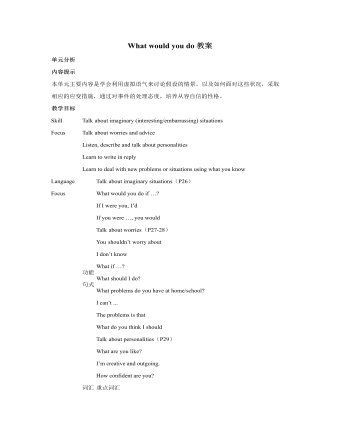
人教版新目标初中英语九年级上册What would you do教案
本课采用任务型教学法,用What would you do if you had a million dollars?这个问句,引出谈论假想情况的话题。 采用提问、启发和归纳的教法,让学生易于接受教材内容,培养学生的语言运用能力。 四、 教学过程设计 Step Ⅰ. Greet the whole class as usual. Step Ⅱ. Warming-up T: Do you have ten Yuan in your pocket? S1: No, I don’t. T: (Take out ten Yuan and give it to the student) OK, never mind. What would you do if it was yours? What would you do if you had ten Yuan? S1: I would buy snacks. T: OK, thank you. Sit down, please. (To the whole class) Just now, it was only ten Yuan. What about 100 Yuan? What would you doif you had 100 Yuan? S2: I’d buy a beautiful jacket. T: Thank you. (To the whole class) Now suppose you had a million dollars, what would you do? We know thatone dollar nearly equals eight Yuan, so that’s a large sum of money. Think it over carefully and tellme your ideas. What would you do if you had a million dollars? S3: I’d buy a big house. S4: I’d buy a sports car. S5: I’d put it in the bank. T: OK, stop here. Please look at the blackboard and guess what would I do if I had a million
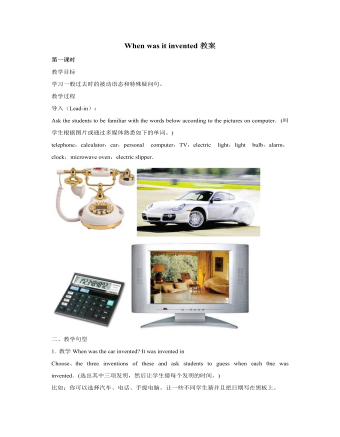
人教版新目标初中英语九年级下册When was it invented教案
二、教学 1a,1b.1.First the teacher asks the students what kind of fruit food and drink you like the best and writes down on the blackboard.教师问学生最喜欢什么水果和饮料并把它们写在黑板上。比如:potato chips,ice cream,tea,lemon,chocolate,oranges,salad,popcorn,pickle and so on.2.接着叫学生表达以上食物的味道,引出新单词——sweet,crispy,salty,sour,delicious,hot,awful,nice…并且完成lb教学内容通过此活动,以旧带新引入新单词。其目的是让学生自主学习新知识。 三、教学 2a,2b1.首先,听力前的brainstormFirst,Let students describe how potato chips taste and describe how helpful the potato chips.Then,ask:When and where were potato chips invented?Who were potato chips invented by?How were potato chips invented?(Let students guess according to the following key words.)Key words:by accident,customer,restaurant,by mistake.(说明:通过问题让学生对对话内容有整体了解,为听力练习做好准备;又培养学生的注意力,想像力,观察力。)
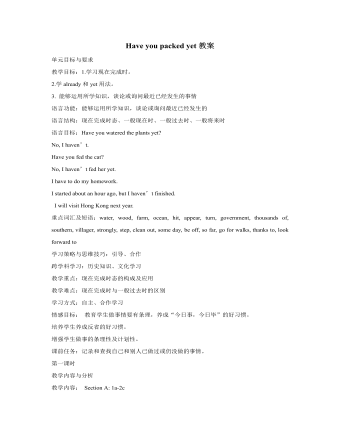
人教版新目标初中英语九年级下册Have you packed yet教案
教学目标:1.学习现在完成时。2.学already和yet用法。3. 能够运用所学知识,谈论或询问最近已经发生的事情语言功能:能够运用所学知识,谈论或询问最近已经发生的语言结构:现在完成时态、一般现在时、一般过去时、一般将来时语言目标:Have you watered the plants yet?No, I haven’t.Have you fed the cat?No, I haven’t fed her yet.I have to do my homework. I started about an hour ago, but I haven’t finished. I will visit Hong Kong next year.重点词汇及短语:water, wood, farm, ocean, hit, appear, turn, government, thousands of, southern, villager, strongly, step, clean out, some day, be off, so far, go for walks, thanks to, look forward to学习策略与思维技巧:引导、合作跨学科学习:历史知识、文化学习教学重点:现在完成时态的构成及应用教学难点:现在完成时与一般过去时的区别 学习方式:自主、合作学习 情感目标: 教育学生做事情要有条理,养成“今日事,今日毕”的好习惯。培养学生养成反省的好习惯。增强学生做事的条理性及计划性。课前任务:记录和查找自己和别人已做过或仍没做的事情。
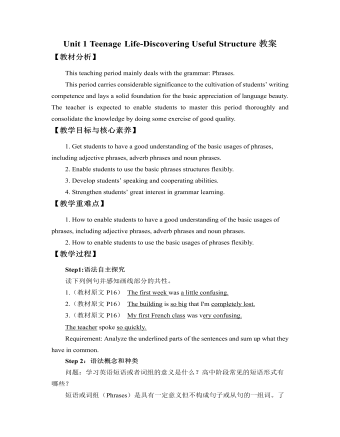
新人教版高中英语必修1Unit 1 Teenage Life-Discovering Useful Structure教案
(形容词短语most beautiful的构成形式为:副词+形容词,该短语在句中作定语修饰名词bird)④A good friend is someone who makes you really happy.好朋友就是能让你真正高兴的人。(形容词短语really happy的构成形式为:副词+形容词,该短语在句中作宾语补足语)[即学即练]画出下例句中的形容词短语并指明构成形式如:It is less cold today than it was yesterday.构成形式: 副词+形容词(1)Our country is becoming more and more beautiful.(2)The road is long enough.(3)The medicine is good for stomach.三、副词短语(Adverb Phrases)副词短语:指以一个副词为中心构成的短语,在句中的功能相当于副词,可以修饰动词、形容词或副词。常见副词短语的构成形式有:(副词)+副词如: much more beautifully①He did his work here yesterday.他昨天在这里工作。(副词短语here yesterday修饰动词did)②Bill did the work very well.比尔做的这份工作很好。副词短语very well修饰动词did③We are all entirely responsible for our action(副词短语all entirely, 修饰形容词短语responsible for)
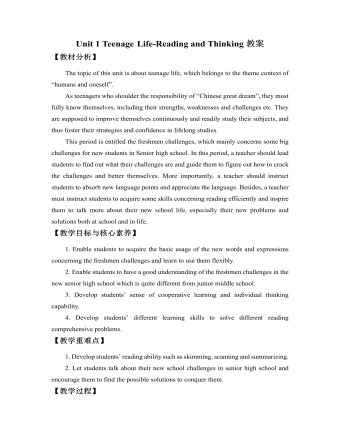
新人教版高中英语必修1Unit 1 Teenage Life-Reading and Thinking教案
【教材分析】The topic of this unit is about teenage life, which belongs to the theme context of “humans and oneself”.As teenagers who shoulder the responsibility of “Chinese great dream”, they must fully know themselves, including their strengths, weaknesses and challenges etc. They are supposed to improve themselves continuously and readily study their subjects, and thus foster their strategies and confidence in lifelong studies.This period is entitled the freshmen challenges, which mainly concerns some big challenges for new students in Senior high school. In this period, a teacher should lead students to find out what their challenges are and guide them to figure out how to crack the challenges and better themselves. More importantly, a teacher should instruct students to absorb new language points and appreciate the language. Besides, a teacher must instruct students to acquire some skills concerning reading efficiently and inspire them to talk more about their new school life, especially their new problems and solutions both at school and in life.【教学目标与核心素养】1. Enable students to acquire the basic usage of the new words and expressions concerning the freshmen challenges and learn to use them flexibly.2. Enable students to have a good understanding of the freshmen challenges in the new senior high school which is quite different from junior middle school.3. Develop students’ sense of cooperative learning and individual thinking capability. 4. Develop students’ different learning skills to solve different reading comprehensive problems.
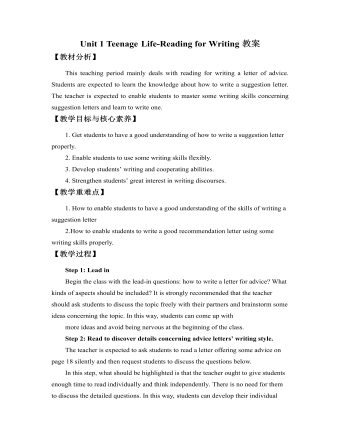
新人教版高中英语必修1Unit 1 Teenage Life-Reading for Writing教案
【教材分析】This teaching period mainly deals with reading for writing a letter of advice. Students are expected to learn the knowledge about how to write a suggestion letter. The teacher is expected to enable students to master some writing skills concerning suggestion letters and learn to write one.【教学目标与核心素养】1. Get students to have a good understanding of how to write a suggestion letter properly.2. Enable students to use some writing skills flexibly.3. Develop students’ writing and cooperating abilities.4. Strengthen students’ great interest in writing discourses.【教学重难点】1. How to enable students to have a good understanding of the skills of writing a suggestion letter2.How to enable students to write a good recommendation letter using some writing skills properly.【教学过程】Step 1: Lead in Begin the class with the lead-in questions: how to write a letter for advice? What kinds of aspects should be included? It is strongly recommended that the teacher should ask students to discuss the topic freely with their partners and brainstorm some ideas concerning the topic. In this way, students can come up with more ideas and avoid being nervous at the beginning of the class.Step 2: Read to discover details concerning advice letters’ writing style.The teacher is expected to ask students to read a letter offering some advice on page 18 silently and then request students to discuss the questions below.

新人教版高中英语必修1Unit 2 Travelling Around–Listening and Speaking教案
无论她说什么都不会对我们的安排有影响。Answers: for, arrangement3) Parents arrange everything for their children and spare no effort to pave the way for their success.父母为孩子安排好一切,不遗余力地为他们的成功铺路。4. extremely adv 极其,非常extreme adj 非常的1) Mary found it extremely difficult to get a job.2) I’m extremely sorry to have troubled you.Answers:玛丽发现找工作极其困难。给你添了麻烦,我十分抱歉。3) It had white-painted tunnels and bright red carriages, and proved _________ (extreme) popular with the public.它有白色的隧道和明亮的红色车厢,结果证明它非常受大众的欢迎。Answers: extremelyExercises1. I am continuing to apply_______ jobs though I have failed several times.2. All this had an _______ (extremely) bad effect on the criminal justice system.3. The invention would have wide ______ (apply) in industry.4. She’s happy with her unusual living _________ (arrange).5. I was banging so loudly that I’m ___________ (amaze) that they didn’t hear me.6. You haven’t changed at all you still look ___________ (exact) the same.7. “Was it what you expected?” “Yes, _________ (definite).”8. He was looking forward to______ (work) with the newPrime Minister. Answers: for extreme application arrangement amazed exactly definitely looking单句写作:1. _______________ (你要说些什么) when you get on the platform to accept the reward?2. Since_____________________(我们为这些事情做好了准备), we have nothing to worry about.
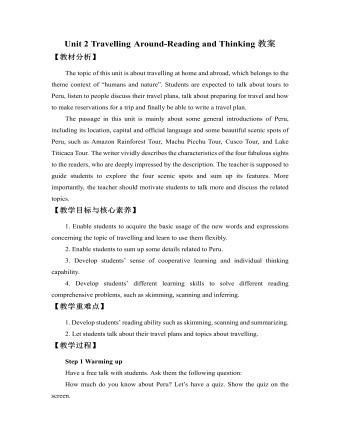
新人教版高中英语必修1Unit 2 Travelling Around-Reading and Thinking教案
Good expressions that students can choose to use: help the travelers choose which tour to take1. In my opinion, you could/might choose…, because you prefer to…2. …could be a perfect choice for you, for…3. As far as I am concerned, you would enjoy…, for…4. …would probably suit you, because you enjoy/love/hate doing…Step 5 Passage ConsolidationLanguage appreciation:1. You can then spend three days exploring the rainforest with a local guide and enjoying the plants and animals unique to the rainforest. 在接下来的三天里,您可以在当地导游的陪同下,深入雨林进行探索,欣赏雨林特有的动植物。本句主体结构为spend some time doing sth. 2. Inca builders cut stones to exact sizes so that nothing was needed to hold walls together other than the perfect fit of the stones. 印加的建筑工人将石头切割成精确的尺寸,仅仅凭着石头间的完美契合,即可稳固墙体。本句为so that引导的结果状语从句。nothing与the perfect fit为并列成分; other than在句中意为“除了”。Step 6 HomeworkSuppose you will travel to Peru, write a short essay about your three-day tour plan.

新人教版高中英语必修1Unit 2 Travelling Around-Reading for Writing教案
Is there a clear purpose for the trip? :Does each paragraph have a clear main idea? Does the writer use the present continuous tense for future plans?Does the writer use commas, stops, and question marks correctly? Are all the words spelt correctly?Are all the proper nouns capitalized?Revise your draft according to your partner's comments.Step 5:The summary of how to write a travel plan.旅游计划是一种常见的应用文写作。旅游可分为观光游、文化游、美食游及探险游等不同类型,因此旅游计划也要根据不同的旅游目的进行设计。常规的旅游计划需要明确以下几个方面的问题:Travel planWhen will you leave for? Where is your the destination?How will you get there?What will you do there?How long will you there?Is there a clear purpose for the trip? 为了提升旅行计划的层级,还需注意以下几个方面的问题:1.每段是否有明确清晰的主题;2.用一般现在时代替一般将来时;3.用更高级的形容词词汇。例如:表达“好”时,不要总用“nice”,我们还可以用“smart, clean, excellent, exciting, beautiful, wonderful, clever, famous, grand”等表达更具有指向性的词汇;4.用更高级的动词词汇。比如:我们可以用“seem stand, lie .get stay, remain, look . sound, become . keep, grow”等代替"be";
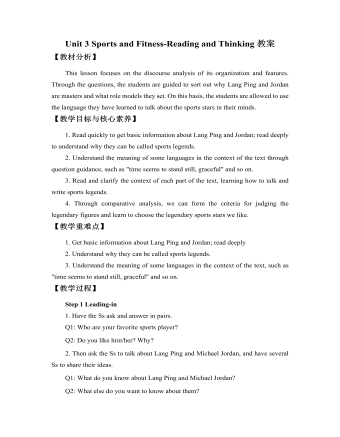
新人教版高中英语必修1Unit 3 Sports and Fitness-Reading and Thinking教案
2. Sort out detailed information about Michael Jordan.(1) Understand the transitional sentence.Q: Which part is about Michael Jordan as a master? Which part is about the example he set?(2) Have the Ss Focus on why Michael Jordan is a master and what good examples Michael Jordan set when they’re reading. And think about these questions as below:Q1: How does the author describe his impressive skills?Q2: How do you understand “time seemed to stand still”?Q3: What does “graceful” mean?Q4. Which sentence do you think best describes his mental strength?Q5. Which words is important in the sentence in describing his mental strength? Why?Q6: How do you understand “unique”?Q7: What can we learn from Michael Jordan?Step 5 Discussing and recommendingRecommend their own living legends of sports.Work in groups to choose your own living legend of sports and give the reasons of your choice. Step 6 HomeworkReview the stories of Lang Ping and Michael Jordan, and try to retell them.

新人教版高中英语必修1Unit 3 Sports and Fitness-Reading for Writing教案
Then have them write a short paragraph to describe and explain their changes. After that, get the Ss to exchange their drafts with their partners and use the checklist to give feedback on their drafts, and finally revise it.Step 5 Summary of how to write a wellness book1.健康书的审题步骤:第一步:明确要求该写作属于经验分享,故要用第一人称来写;时态以一股现在时为主。第二步:确定段落该类文章可以从以下三个方面人手:Para.1首先表明写作的目的Para.2自己的做法及心得体会Para.3表示期望及感谢第三步:提炼要点2.健康书常见句式:1) It is an honor for me to share my favorite sport with you,2) It makes me feel relaxed playing with my friends.3) It makes me rid myself of stress while playing with my friends.4) Moreover, it provides me a valuable chance to communicate with others.5) I we eat too little or too much, or if we choose the wrong food, we may become sick.6) We can do something to change the poor situation.Step 6Homework假如你的老师让你在班级Wellness Bok上分享自己的亲身经历及心得,请根据以下要点写一篇80字左右的文章1. 你喜欢的运动是什么?2. 你最喜欢的原因是什么?3. 你参加锻炼的体会。
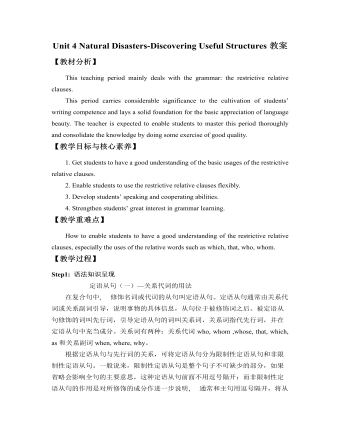
新人教版高中英语必修1Unit 4 Natural Disasters-Discovering Useful Structures教案
【教材分析】This teaching period mainly deals with the grammar: the restrictive relative clauses.This period carries considerable significance to the cultivation of students’ writing competence and lays a solid foundation for the basic appreciation of language beauty. The teacher is expected to enable students to master this period thoroughly and consolidate the knowledge by doing some exercise of good quality.【教学目标与核心素养】1. Get students to have a good understanding of the basic usages of the restrictive relative clauses.2. Enable students to use the restrictive relative clauses flexibly.3. Develop students’ speaking and cooperating abilities.4. Strengthen students’ great interest in grammar learning.【教学重难点】How to enable students to have a good understanding of the restrictive relative clauses, especially the uses of the relative words such as which, that, who, whom.【教学过程】Step1: 语法知识呈现定语从句(一)—关系代词的用法在复合句中, 修饰名词或代词的从句叫定语从句。定语从句通常由关系代词或关系副词引导,说明事物的具体信息,从句位于被修饰词之后。被定语从句修饰的词叫先行词,引导定语从句的词叫关系词,关系词指代先行词,并在定语从句中充当成分。关系词有两种:关系代词who, whom ,whose, that, which, as和关系副词when, where, why。
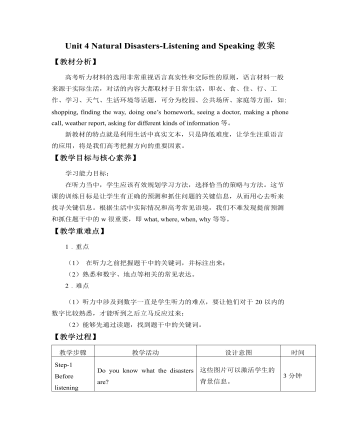
新人教版高中英语必修1Unit 4 Natural Disasters-Listening and Speaking教案
【教材分析】高考听力材料的选用非常重视语言真实性和交际性的原则,语言材料一般来源于实际生活,对话的内容大都取材于日常生活,即衣、食、住、行、工作、学习、天气、生活环境等话题,可分为校园、公共场所、家庭等方面,如: shopping, finding the way, doing one’s homework, seeing a doctor, making a phone call, weather report, asking for different kinds of information等。新教材的特点就是利用生活中真实文本,只是降低难度,让学生注重语言的应用,将是我们高考把握方向的重要因素。【教学目标与核心素养】学习能力目标:在听力当中,学生应该有效规划学习方法,选择恰当的策略与方法。这节课的训练目标是让学生有正确的预测和抓住问题的关键信息,从而用心去听来找寻关键信息。根据生活中实际情况和高考常见语境,我们不难发现提前预测和抓住题干中的w很重要,即what, where, when, why等等。
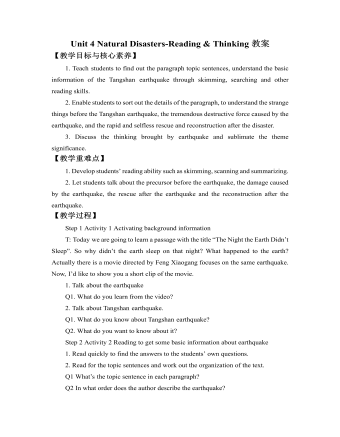
新人教版高中英语必修1Unit 4 Natural Disasters-Reading & Thinking教案
5. Read to get detailed information about Paragraph 5.Q1. What shows the revival of Tangshan?Q2. How can Tangshan revive itself and get up on its feet again?Q3. In times of disasters, how can we go through it?T: In times of disasters, we should unify, show the wisdom and stay positive.Step 4 Activity 4 Highlighting the theme and reflecting1. Make a summary of the text.2. Further understand the titleQ: After our learning, why do you think the earth didn’t sleep on that night?T: An earthquake happened. The people in the earthquake suffered a lot, and the people outside Tangshan were concerned about the people there a lot.3. Reflect through discussion on what can be learnt after reading.T: Disasters are powerful. Unpreparedness can be deadly. Life is weak, but if people work together to help each other, disasters can be defeated.There is no love from disaster, but we have love in the human heart.Step 5 Assignment How does the writer convey that the earthquake was deadly, and that people were helpless during the earthquake? Try to find some attractive and impressive expressions and note them down.
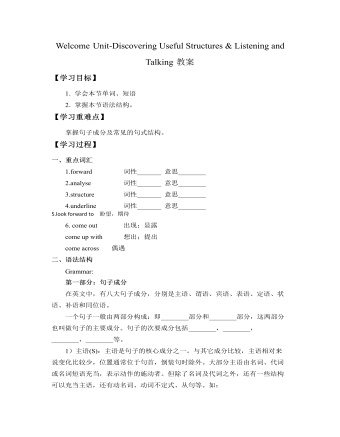
新人教版高中英语必修1Welcome Unit-Discovering Useful Structures & Listening and Talking教案
常跟双宾语的动词有:(需借助to的)bring, ask, hand, offer, give, lend, send, show, teach, tell, write, pass, pay, promise, return等;基本句型 五S +V + O + OC(主+谓+宾+宾补)特点:动词虽然是及物动词,但是只跟一个宾语还不能表达完整的意思,必须加上一个补充成分来补足宾语,才能使意思完整。 判断原则:能表达成—宾语 是…/做…注:此结构由“主语+及物的谓语动词+宾语+宾语补足语”构成。宾语与宾语补足语之间有逻辑上的主谓关系或主表关系,若无宾语补足语,则句意不够完整。可以用做宾补的有:名词,形容词,副词,介词短语,动词不定式,分词等。如:He considers himself an expert on the subject.他认为自己是这门学科的专家。We must keep our classroom clean.我们必须保持教室清洁。I had my bike stolen.我的自行车被偷了。We invited him to come to our school.我们邀请他来我们学校。I beg you to keep secret what we talked here.我求你对这里所谈的话保密。用it做形式宾语,而将真正的宾语放到宾语补足语的后面,以使句子结构平衡,是英语常用的句型结构方式。即:主语+谓语+it+宾补+真正宾语。如:We think it a good idea to go climb the mountain this Sunday.

